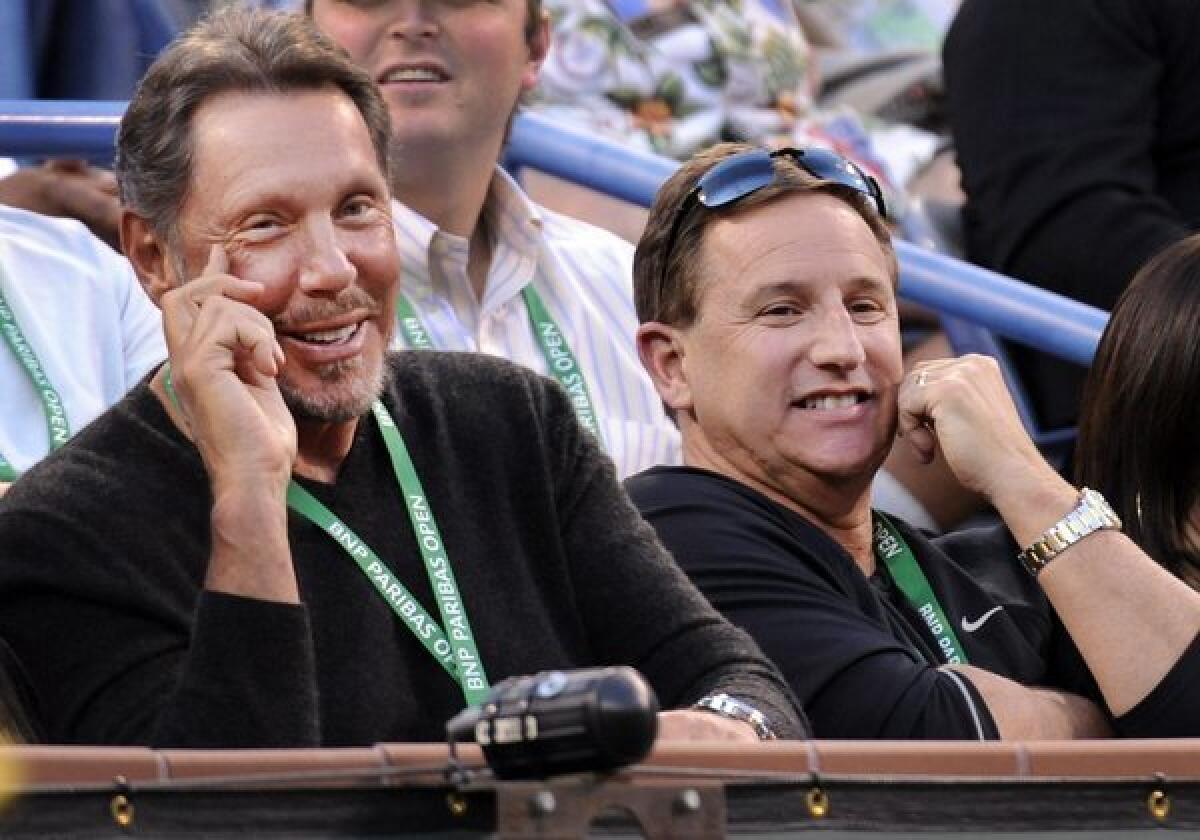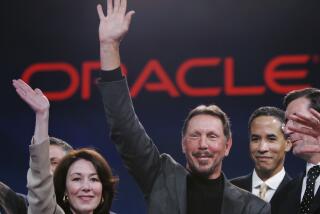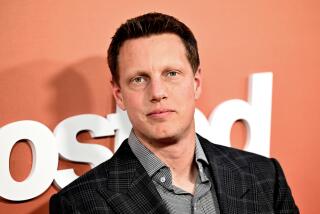Oracle’s Mark Hurd on the week when pigs flew in Silicon Valley

Even in a place where the seemingly fantastic happens on a daily basis, the events of last week involving Oracle Inc. left many long-time observers of the tech scene in Silicon Valley stunned.
Oracle, the Redwood City giant best known for its database software, announced a series of partnerships with two sworn blood enemies (Microsoft and Salesforce.com) and another rival with whom it has a complicated relationship (NetSuite). This followed by a few weeks another deal with a rival, Dell.
For those of you who don’t follow the enterprise software market (OK, that’s most of you), let’s lay this out.
This was the Hatfields marrying McCoys. This was Lannisters hugging Starks. This was Dodgers fans buying Giants fans a beer and giving them a high-five.
PHOTOS: Google Street View from 22,000 feet
People up here were using headlines with words like “Hell Freezes Over.” Were they right?
“I think there’s some truth to it,” said Oracle President Mark Hurd. “I think it’s different for us.”
The shift to embrace more partnerships was a practical calculation by a company that hasn’t always been known to play well with others.
Oracle’s reputation has been built very much in the image of its founder, Larry Ellison. It’s brash, competitive, hard-charging and confrontational. Though there have been some partnerships, Oracle preferred to sell technology it built itself with its own sales force, rather than relying on other companies to help it reach customers.
The Oracle vs. the World mentality has served the company well since it was founded in 1977.
But there is also a growing sense among Wall Street analysts that the company was late to embrace cloud computing, focusing too long on its traditional software business.
Oracle shifted gears a couple of years ago, and Ellison declared the company “all in” on the cloud. But it’s taking awhile for those efforts to get traction. In the last two quarters, the company missed some analysts’ estimates.
In the past, this might have been the moment when the competitive adrenaline spikes and war is declared.
But this week, something different happened. Oracle extended its hand to some of the unlikeliest of partners.
And some analysts pointed to Hurd’s presence as an important catalyst in making that happen.
“I think it probably took a Hurd to come in and deliver the sobering reality from somebody they trust,” said Patrick Moorhead, principal analyst at Moor Insights and Strategy. “If there’s someone that Larry Ellison trusts, it’s Mark Hurd.”
The pair were friends even when Hurd was chief executive at Hewlett-Packard, a competitor and partner. When Hurd left HP in 2010 amid a dispute with the board, Ellison publicly defended him and called the board’s pushing out of Hurd the dumbest move in Silicon Valley since Steve Jobs left Apple.
Ellison hired Hurd just a few months after he left HP.
Frenemies. Co-opetition. These are words that have been around Silicon Valley forever. You compete with companies in some places. You cooperate in others. You compartmentalize your feelings.
Hurd dismisses the idea that he was the main force behind the shift, saying the decision to pursue the partnerships was the result of ongoing conversations between himself, Ellison and Oracle’s other president, Safra Catz.
“These were deals where we had an opportunity to bundle our [technology] with and increase our distribution and we took advantage of that,” he said.
Over the past decade, Oracle has spent more than $45 billion acquiring more than 70 companies. That has significantly broadened the range of products Oracle sells, including getting into the hardware business of selling servers through its purchase of Sun Microsystems.
Throw in the new cloud services, and Oracle has a lot of new stuff the company is trying to sell customers. Oracle, Hurd said, concluded that it was time to change its approach to expose customers to those new products.
“We’re in a position where we have marvelous [technology],” Hurd said. “And we really want to get in front of more customers. I consistently get the feedback that we have great technology. The awareness level of everything we have in portfolio is where we need more help.
“The reality for us is that we needed some ability to catalyze this,” he said. “This was more about aligning our resources.”
So, in early June, Oracle announced a partnership with Dell, to put Oracle software on Dell servers to help it reach smaller businesses. Both companies compete to sell servers.
While that raised eyebrows, it was this past week that blew the valley’s mind.
First came a deal with Microsoft. Back in the 1990s, Ellison was one of the chief antagonists of Bill Gates and his company when it was facing the federal government’s antitrust lawsuit.
Though the companies compete in some areas, Hurd said Oracle liked the deal because it would give the company the ability to put its Java software in Microsoft’s cloud service, Azure, where it would reach more customers.
“You can take the point of view, ‘I don’t want to deal with those guys,’” he said. “Or you can take the view that there’s a lot of customers in their cloud and now you have the ability to get them to use Java. I believe we get more net distribution out of that arrangement.
“We hope to do more collaboration with Microsoft,” Hurd said. “I think it would be better for Oracle. I think it would be better for Microsoft. And I think it would be better for customers.”
Then Oracle announced a deal with NetSuite, integrating the former’s human resource software into the latter’s cloud service. Ellison was one of the biggest investors in NetSuite, and remains a major shareholder.
But perhaps the biggest shocker was saved for last: The deal with Salesforce.com.
Salesforce.com was founded by Marc Benioff, a former Oracle employee and Ellison disciple. Benioff created Salesforce.com, which was a cloud pioneer, and was financed in part by Ellison.
The pair had a falling out when Ellison also backed rival NetSuite. Over the years, Benioff and Ellison have traded endless barbs. Benioff mocking Ellison for not embracing the cloud. Ellison mocking the cloud as meaningless marketing babble.
So when the pair suddenly laid down arms last week, the valley, well ... here’s a sample of the reaction:
Oracle standardizing on Salesforce is tantamount to Microsoft standardizing on iPhones. This is game changing. — Aaron Levie (@levie) June 27, 2013
Oracle And Salesforce Bury The Hatchet--Surprisingly, Not In The Others’ Back… https://t.co/zRgTjZ5Hi8 https://t.co/SPFbtB3lZC — Techmeme (@Techmeme) June 28, 2013
Salesforce.com will start using Oracle’s human resource products and Oracle will being using Salesforce’s customer management services. During a conference call last week, Benioff and Ellison sounded so chummy that many bloggers dubbed it a new “bromance.”
“We’re making that commitment to Oracle and it’s such an easy commitment for both of us to make because there is no company that I’d rather partner with to be the heart of our database infrastructure than Oracle,” Benioff gushed. “Now, in regards to what is the next up with Oracle, and Salesforce working together, I think that the opportunities are really just endless.”
For now, Moorhead said Oracle will need to focus on getting this slew of new partnerships to work. As remarkable as the announcements have been, there still remains a lot of work on the ground level to get the employees on the front lines of all the companies to communicate and cooperate.
“I think it’s going to be a difficult road forward for them over the next couple of years until they can get complete traction with these types of alliances,” Moorhead said. “These types of alliances take years to optimize.”
Still, all this has observers speculating about which once-unthinkable partnership could be next. Is it possible that Oracle would even consider a partnership with IBM, one of its longest rivals and the focus of Ellison’s taunts over the years?
Hurd wouldn’t commit to specific numbers or types of partnerships. But he made it clear that Oracle isn’t done.
“Our behavior is indicative of our thinking,” Hurd said. “I wouldn’t say this would be a typical week for us. But at the same time, I think it shows how we want to work with the industry.
“We’re going to continue to look for relationships that make sense, that have the broadest impact on the market. We want to do more things like this. But they have to be things that make sense.”
Also:
Meet Donna, your new mobile personal assistant
Is popularity of Vine slipping with debut of Instagram video?
As book closes on Google Reader, new ways to read news online
More to Read
Inside the business of entertainment
The Wide Shot brings you news, analysis and insights on everything from streaming wars to production — and what it all means for the future.
You may occasionally receive promotional content from the Los Angeles Times.











